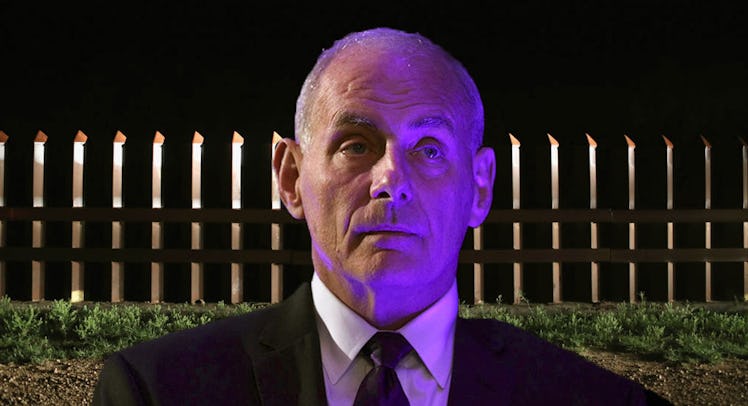We Need a Better Plan for Immigrant Children
Trump's Chief of Staff is unconcerned with the wellbeing of children separated from their parents. Immigration debate aside, that's a scandal.

Last week, White House Chief of staff John Kelly went on National Public Radio to make it clear that despite repeated bald-faced statements to the contrary, the Trump administration does not view immigrants as dangerous criminals. Regrettably, Kelly didn’t stop there. A second later, he defended the practice of separating children from their families at the border as a deterrent to illegal immigration. He then explained that the children torn from their mothers and fathers would be handled by “foster care or whatever,” a flippant phrase that betrayed the dismissiveness of not only Kelly but Jeff Sessions and the architects of the Justice Department program to the suffering of children.
The phrase was enough of a rhetorical roadblock that it prompted many to stop and further inspect the logic of the Justice Department program, which is being touted as a humane deterrent, which is an oxymoron. The program is designed to deter border crossings by presenting a profound threat to parents. It is fully intended to terrify. If it weren’t, it would not make sense as a program. The idea then that Americans should not see the separation as an act of retribution perpetrated against families, is ludicrous. For hardliners, the suffering of Guatemalan children might be an appropriate price for a secure border, but there’s little reason to think most Americans are sympathetic to that perspective. With the Pew Research Center uncovering a net outflow of migrants — more are leaving than coming in — America could afford a more humane approach.
Instead, the word of the day is “tough.” That’s John Kelly’s macho go-to. “It could be a tough deterrent — would be a tough deterrent,” he told NPR.
What makes that separation particularly terrifying and also particularly morally suspect is, however, not the cold logic of the thing. It’s the unknown. The word “whatever” hangs over the head of children who did nothing wrong, but emerge from the womb into bad circumstances.
This might sound like rhetorical nitpicking, but it’s not. In 2017, the Health and Human Services Department, which is responsible for placing migrant children into the homes of adult sponsors, lost track of 1,475 children. In other words, a government agency took responsibility for the welfare of children then misplaced them. Are they safe? Are they being trafficked? Nobody knows. Maybe that’s the “whatever” that Kelly is referring to, the giant crack built for children to fall into.
It’s worth noting that those 1,475 migrant kids were all unaccompanied minors. Now, imagine a situation in which those kids were lost despite the fact that each had loving parents. Imagine the American government had torn families apart, creating free radicals.
There are those that suggest that immigrant children might be better off with kind American strangers. That’s a nice thought, but those willing to entertain it badly misunderstand the foster care system. It is a safety net. That’s pretty much it. There are far too few people to monitor the progress of the children already in the system. And it’s telling that a study found nearly half the runaways in California had been in foster care at some point. Even for American kids, taken from their parents for a multiplicity of very good reasons, it’s difficult to find positive outcomes from foster care.
So why, then, would the administration decide the best idea was to throw even more disadvantaged kids into an overburdened system with struggling oversight? The short and accurate answer seems to be “whatever.”
At one point in his interview Kelly, who is a father, evinced sympathy for migrants and acknowledged that they were heading to America for understandable reasons. He did not dive into the specifics of the violence families flee or the specific threats to children that exist in places like El Salvador, but he gestured in the direction of empathy. He publically faced the truth that these people are willingly staring down very long odds and will keep coming.
So, again, what is a “tough deterrent” but the promise of future violence, an assurance that America will not be safer for your children than wherever you started walking.
This article was originally published on